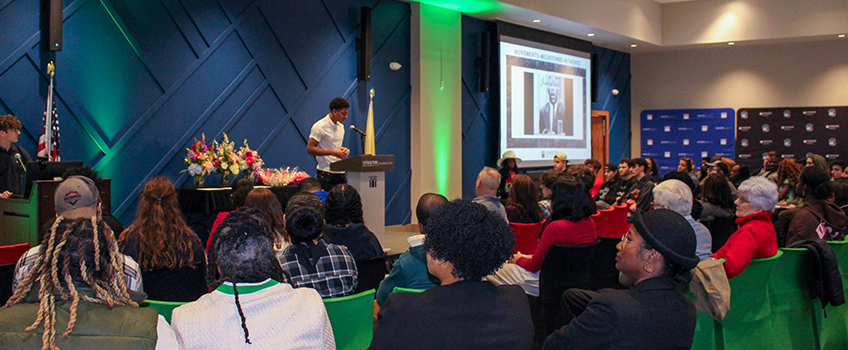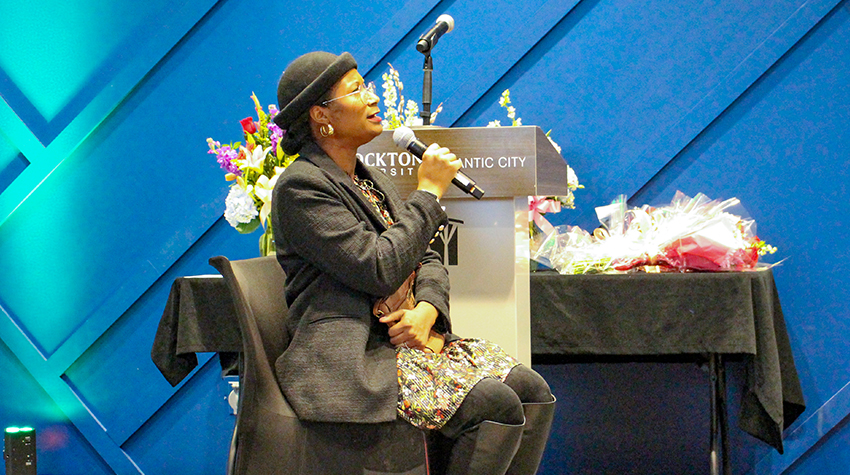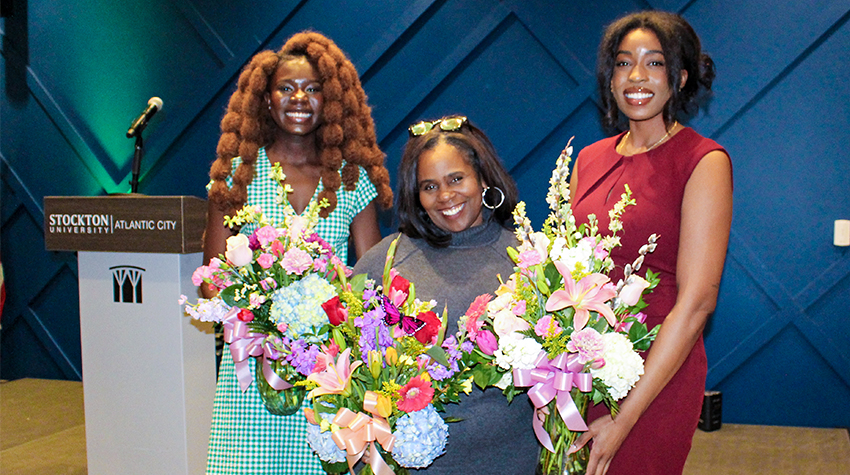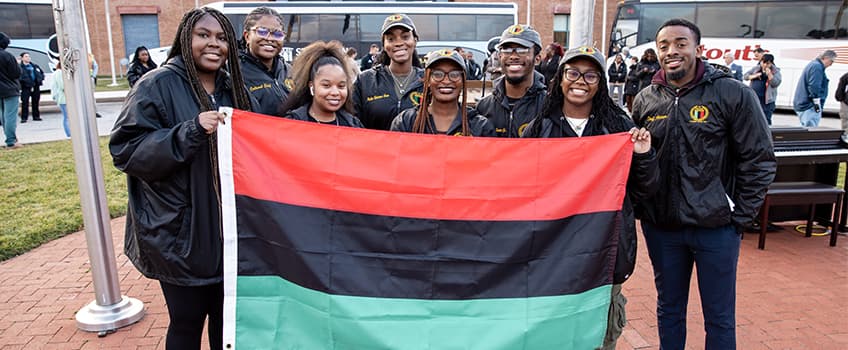Honoring the Movements, Milestones and Moments That Shaped Black History

Students, staff and faculty gathered to conclude Black History Month with a program hosted by the Residential Scholars on Thursday, Feb. 29.
Atlantic City, N.J. – In honor of Black History Month, the campus community gathered in the Fannie Lou Hamer Event Room for an evening of performances, education and more on Thursday, Feb. 29.
The goal of the program, hosted by the Residential Scholars, was to celebrate the fullness of the African-American experience by honoring everyday people alongside the icons and legends, as well as educating the next generation on the importance of learning Black history.
“I think it is so important for us to make sure that we keep our students aware of what has happened and why these things are important, because if we don't know our past, the things that we have gone through or those who have really fought for us to be here, we are doing them a disservice and an injustice,” Marques Johnson, associate Dean of Students, said in his opening remarks.
The program incorporated brief videos discussing Carter G. Woodson and how he created Black History Week, the history of the Unified Cultural Greek Council (also known as the Divine Nine) and the utilization of the Black church as grounds for community building.
There were also musical performances by singer, songwriter and actress Gia Ware and Cultural Engagement Osprey intern Ter’ron Oglesby. In addition to singing the Black national anthem, “Lift Ev’ry Voice and Sing,” and “How Great is Our God,” Ware reenacted the fateful day that Rosa Parks sat in the front of a bus and performed an emotional rendition of “Turn Me Round.”
During staff remarks, Tammy Saunders and Valerie Hayes both emphasized how impactful learning Black history was for them when they were undergraduates and how that impact is still felt today.

Saunders, who is Stockton University’s director of Title IX and EEO, told the audience that her grandmother and mother always instilled in her the importance of honoring the “inventiveness, intelligence, ingenuity, perseverance and resiliency” of African Americans due to their connection to the Divine Nine as Alpha Kappa Alpha Sorority sisters.
“My experience in learning more about Black history and as an AKA continues to shape and mold my experience in ensuring that the members of the Stockton community are afforded the opportunity to report matters that may run counter to institutional values, and while ensuring that we are upholding one’s rights and responsibilities,” Saunders said.
Hayes, the chief officer for Diversity & Inclusion, introduced the audience to three names that are rarely mentioned when discussing Black history: Michael “Mickey” Schwerner, Andrew Goodman and James Chaney.
Schwerner was a white Jewish Cornell alum who worked for the Congress of Racial Equality (CORE) in nearby Meridian, Mississippi. The Martin Luther King, Jr. Research and Education Institute at Stanford University notes that CORE was “founded in 1942 by an interracial group of students in Chicago as a pioneering use of nonviolent direct action in America’s civil rights struggle.” Chaney was a local black resident who also worked for the Congress of Racial Equality. Goodman, who was white, joined hundreds of other college students from around the country who converged on Mississippi as part of a Freedom Summer Project to educate and register Black people to vote. The men drove to Meridan, Mississippi, but never came back home – their mutilated bodies were found in nearby Philadelphia, Mississippi, one and a half months later.
Hayes wept for a very long time because by the time her journey carried her to the lives and brutal murders of Schwerner, Goodman and Cheney, she had already pieced together so much of America’s past in ways that schools cannot or do not have the time to teach in detail. Her journey into history led her to a stained-glass window in Sage Chapel at Cornell University– where Schwerner graduated in 1961 and where Goodman’s parents met and later married.
“The eyes of all three were piercing through my soul and it almost felt, to me, like they wanted me to do something, at least not let their deaths go in vain,” Hayes shared. “I wish James, Mickey and Andrew could have lived to see the passage of the Civil Rights Act because that act formed the foundation for subsequent federal civil rights laws, such as the 1973 Rehab Act, the Americans with Disabilities Act, the Age Discrimination in Employment Act and so on.
“Knowing and understanding history is important because it is the foundation upon which we build progress in the present and the future. To know Black history and the Black experience in this country without historical facts and actions involving race, racism, and the struggles for equality and freedom, is impossible,” Hayes said.

Following the speeches were the awards – Maya Lewis, professor of Social Work, Olutoyosi Aboderin, dual credit coordinator for Africana Studies, and student Vera Tagtaa each won an award for educating students on Black history, inspiring students to learn more, and creating a welcoming and inclusive environment wherever they go.
“We all have a call to action to not only celebrate the past but be inspired by it and pave the way for the future, because all of us are individuals, but together we are the community we should be working together,” residential scholar Nicholas Avilleira said during final remarks. “Go forward, take all the information you learned tonight and try to make something better work for our community and for our future.”
Pan-African Flag Raising Kicks Off Black History Month
February 2, 2024

Galloway, N.J. — Did you know that the Pan-African flag was the first flag of cultural heritage to be permanently displayed in the Arts & Sciences Circle at Stockton University?
According to Haashim Smith-Johnson, an Admissions recruiter and former president of the Unified Black Student Society, the idea of having the flag raised for more than the month of February came out of the organization’s desire to make a statement on campus in 2017. He encouraged students to honor the organization’s legacy through decisive action when thinking of ways to make Stockton an inclusive campus for everyone.
“This one thought turned into action, which turned into Black Stockton history,” Smith-Johnson, who is currently staff advisor for UBSS, said. “Student leaders of UBSS and all of the other adjacent student organizations: no idea is outlandish. Please continue to represent the culture and advocate for yourself. Your future self, as well as future generations of marginalized Stockton students, will absolutely thank you.”
This was just one of many valuable lessons that attendees heard during the annual Black History Month Flag Raising on Thursday, Feb. 1. Following a beautiful rendition of the Black national anthem, “Lift Ev’ry Voice and Sing,” by student Lillian Nickels and professor of Music Beverly Vaughn, several speakers all had a common thread — the importance of acknowledging history that future generations will learn from and study.
– Story and photos by Loukaia Taylor


